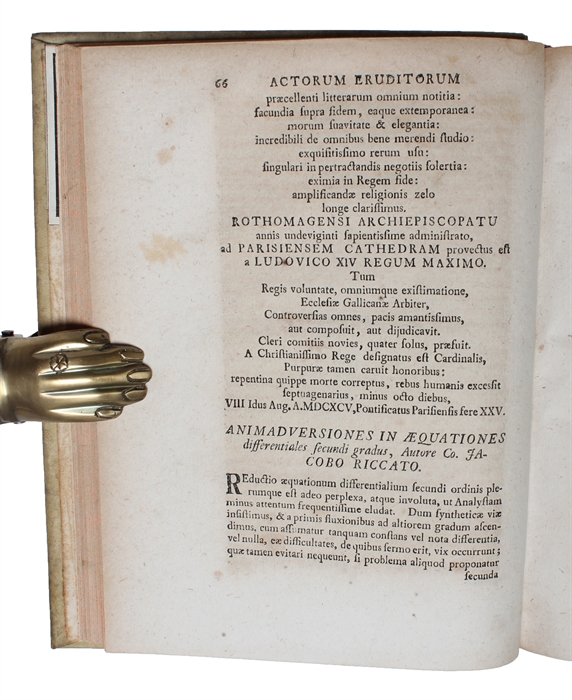THE RICCATI-EQUATION
RICCATO, JACOBO. (JACOPO FRANCESCO RICCATI) - DANIELIS BERNOULLI (DANIEL BERNOULLI).
[Riccati:] Animadversiones in aequationes differentiales secundi gradus. + [Bernouilli:] Notata in praecedens schediasma III. Co. Jacobi Riccati. (In: Actorum Eruditorum, Supplementa. Tomus VIII, 66-75 pp.).
Leipzig, Gross & Fritsch, 1724. 4to. Entire volume present. Nice contemporary full vellum. Small yellow paper label pasted to top of spine and library-label to inside of front board. Two smaller library stamps to title-page. Internally some browning and brownspotting, due to the paper quality. Overall a nice and tight copy. [Riccati-paper:] pp. 66-73. [Bernouilli-paper:] pp. 73-75. [Entire volume: (2), 532, (34) pp.].
The important first printing of Riccati's main work, his influential "Animadversiones in aequationes differentiales secundi gradus", in which the famous Riccati-equation is presented + Bernouilli's famous note on it.
"In his "Animadversiones in aequationes differentiales secundi gradus," published in Acta Eruditorum in 1724, Riccati suggested the study of cases of integrability [...] which is now known by his name. In response to this suggestion Nikolaus II Bernoulli wrote an important treatise on the equation and Daniel Bernoulli presented, in his Exercitationes quaedam mathematicae, the conditions under which it may be integrated by the method of separation of the variables. Euler also integrated it." (DSB, XI).
"In the supplement volume to Acta Eruditorum, Riccati's paper is immediately followed by Daniel Bernoulli' Notata (St. 5.). As the latter admitted in the Exercitationes, he had Riccati's paper in his hands for two days before it was sent to Leipzig. In this short paper Daniel Bernoulli first claims that equation (D) is not an appropriate example because by substituting dy=q it can easily ("Haud magno negotio") be reduced to a first order differential equation." (Die Werke von Daniel Bernoulli, 1996, Birkhäuser, Volker Zimmermann (edt).
"Riccati ( 1676 - 1754) was the son of a noble family who held land near Venice. His renown was such that Peter the Great invited him to come to Russia as president of the St. Petersburg Academy of Sciences. [...]. Riccati carried on an extensive correspondence with mathematicians all over Europe. His work were collected and published, four years after his death, by his sons, of whom two, Vincenzo and Giordano were themselves eminent mathematicians. (DSB, XI).
Order-nr.: 42595


![[Riccati:] Animadversiones in aequationes differentiales secundi gradus. + [Bernouilli:] Notata in praecedens schediasma III. Co. Jacobi Riccati. (In: Actorum Eruditorum, Supplementa. Tomus VIII, 66-75 pp.).](/images/product/42595b.jpg)
![[Riccati:] Animadversiones in aequationes differentiales secundi gradus. + [Bernouilli:] Notata in praecedens schediasma III. Co. Jacobi Riccati. (In: Actorum Eruditorum, Supplementa. Tomus VIII, 66-75 pp.).](/images/product/42595c.jpg)